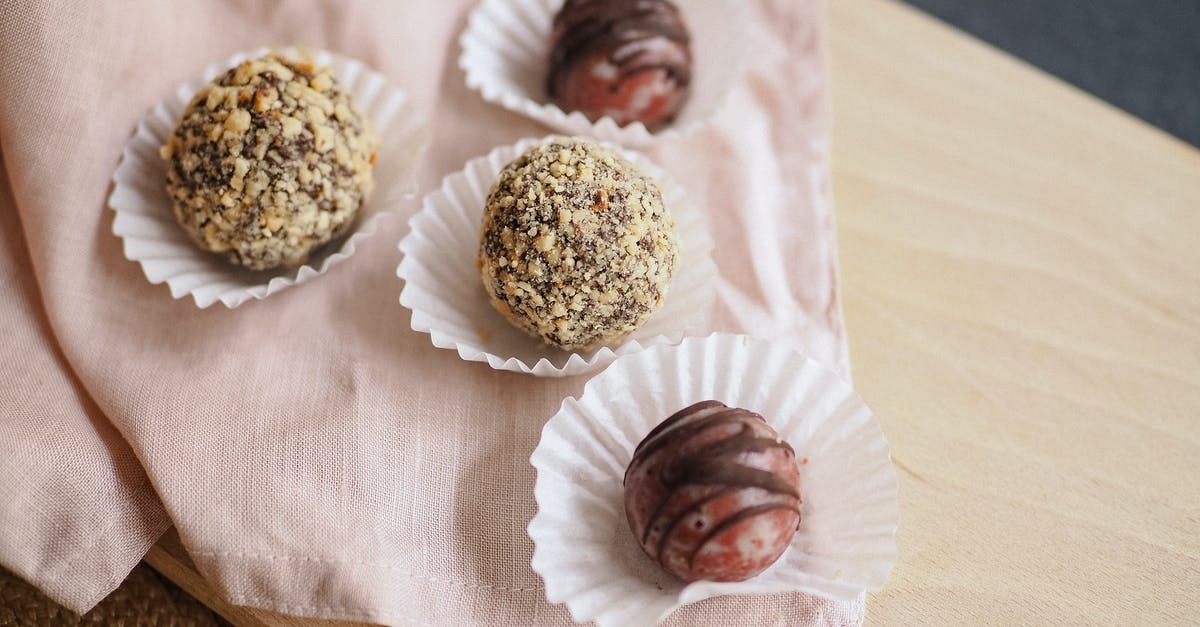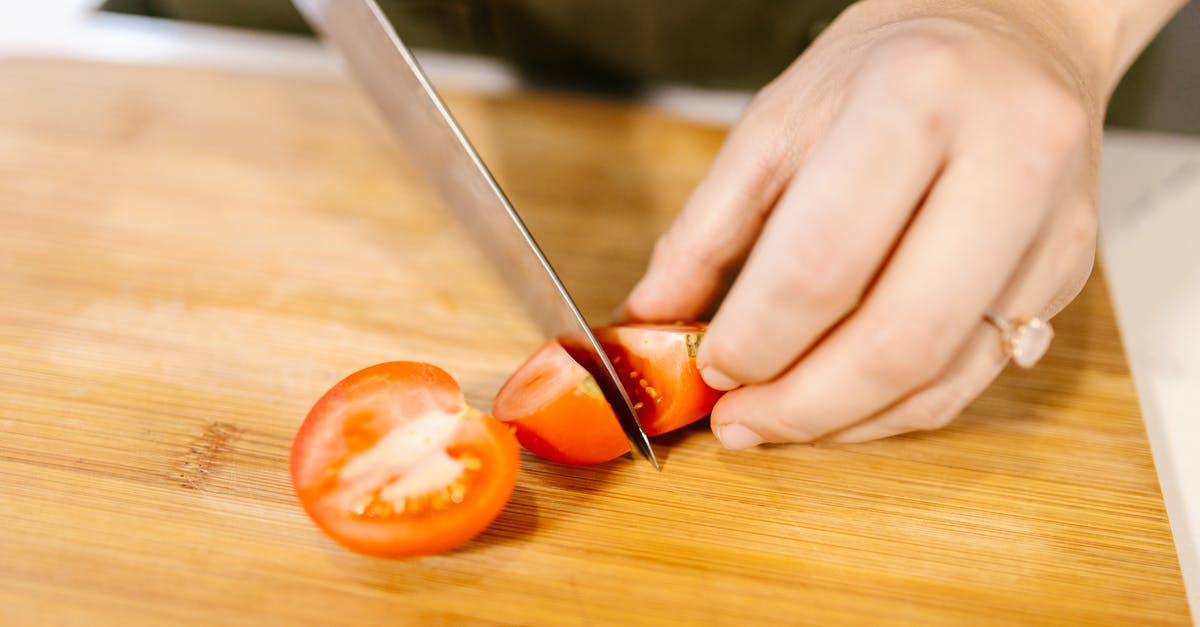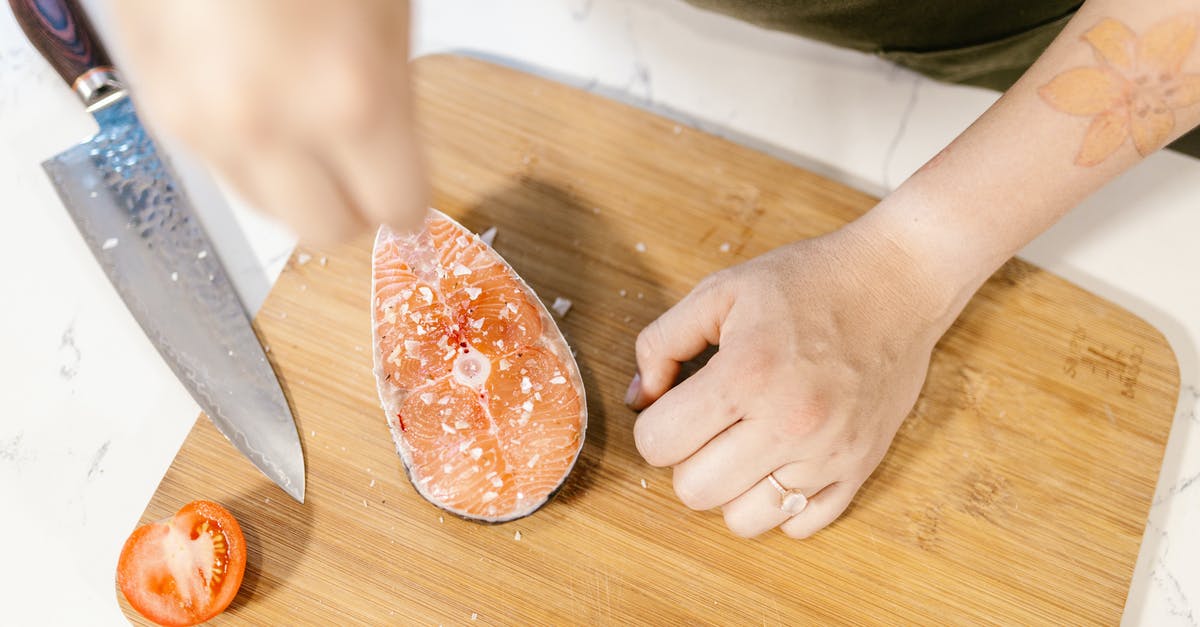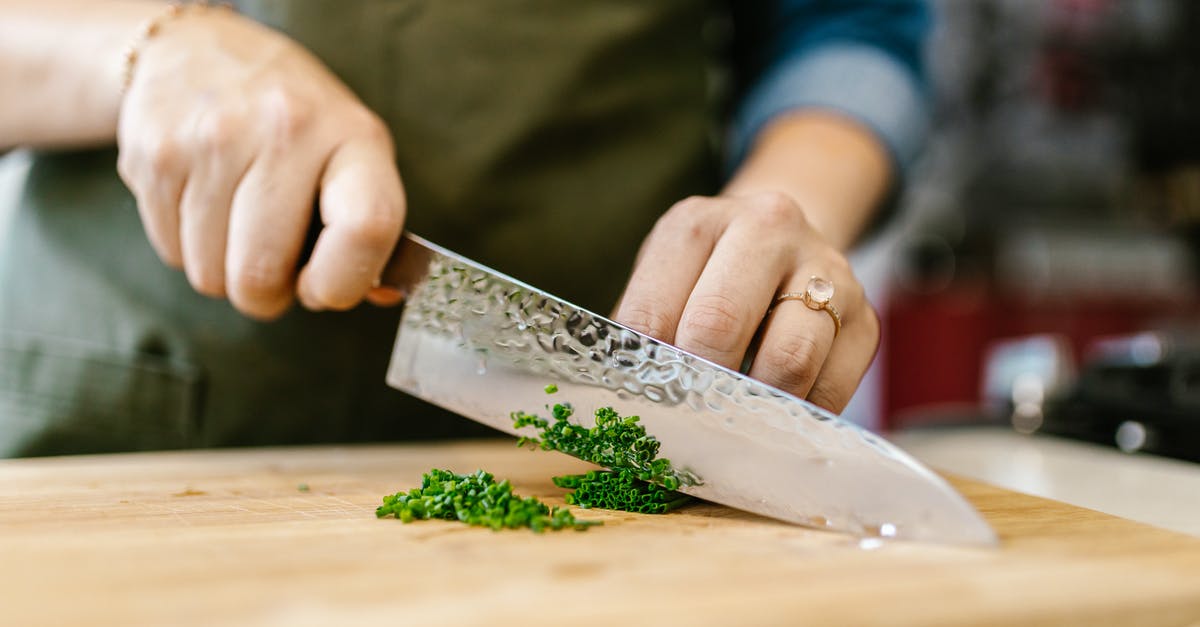Non-plastic cutting board that can be cleaned in a dishwasher

We currently have the following dilemma:
- My wife does not want us to use plastic cutting boards because of the potential negative health effects of ingesting microplastics.
- I really really do not want to wash cutting boards by hand. Yes, I'm aware that there is no alternative for sharp metal knifes and non-stick coated pans, but I don't want to add another item to that list of annoying exceptions.
We tried standard wooden cutting boards, but they tend to bulge and crack after a few rounds in the dishwasher.
Is there some alternative cutting board material that we could use which satisfies both requirements as stated above? Are there maybe special types of wood that are more "dishwasher compatible"?
Best Answer
There are 2 non-plastic cutting board options that I'm aware of that are dishwasher safe and aren't damaging to knives like glass boards.
First, there are the rubber cutting boards popular with commercial kitchens, sold under brand names like Sani-TUFF. While some sources (e.g. KaTom Restaurant Supply) claim these have to be hand washed, they are popular in commercial kitchens because they can handle the heat of the commercial sanitizing dishwashers without warping or melting, and they don't pick up scratches as easily as plastic. They are also generally anti-microbial, I assume because they are non-porous. Although these are usually synthetic rubber, they are much harder than plastic cutting boards -- though not too hard on your knives -- and the likelihood of you consuming any part of them inadvertently should be pretty small.
Next, there are wood fiber composite cutting boards. The brand I know best of these is the Epicurean label. They are made from various specific materials, but the Epicurean label is made from a paper composite called Richlite. Assuming it's the blend discussed on the Richlite page, it is 65% recycled paper and 35% phenolic resin. While that is a synthetic polymer, it's much harder than your typical cutting board and is unlikely to melt (up to 350°F) or react with anything it's likely to come into contact with in your kitchen. These boards are also quite dense, so again, the likelihood of you consuming any of it unintentionally is exceedingly low.
Both of these products are also "workable", meaning you could cut them to custom sizes or shapes and sand them if they ever get scratched up enough to need it.
For what it's worth, environmental sources of microplastics are a much stronger vector than anything in your kitchen, and many of these are practically unavoidable. However, if you are concerned about plastic from cutting boards, both of the above options are far more durable and less likely to introduce plastic into your food but are more convenient than wood in terms of cleaning. Of course, I encourage you to research these on your own and use your best judgment.
Pictures about "Non-plastic cutting board that can be cleaned in a dishwasher"



What kind of cutting boards can go in the dishwasher?
Best dishwasher-safe cutting boards \u201cMost plastic, acrylic, or composite cutting boards are dishwasher-safe, which is a perfect way to sanitize your raw meat boards.\u201d He likes these durable, BPA-free boards, which are designed to stay in place while you're chopping.Can I put my cutting board in the dishwasher?
The main reason you should never place a wooden board into your dishwasher is that the prolonged exposure to heat and water will cause your cutting board to warp and crack.Can bamboo cutting boards go in dishwasher?
They can't go in the dishwasher. While a bamboo cutting board may look sturdy enough to toss in the dishwasher, it's best not to. Instead, treat it just like you would a wood cutting board. Hand-wash the board in warm, soapy water and dry it immediately \u2014 don't allow it to soak in the water.Can synthetic cutting boards be sanitized in a dishwasher?
A hard non-porous cutting board such as one made of acrylic plastic is easier to clean than a wooden board because the acrylic board can be washed in the dishwasher. Whether you prefer to use a plastic or wooden cutting board be certain to sanitize it after it issued for cutting raw meat or poultry.Why I Chose A Plastic Cutting Board Over Wood
More answers regarding non-plastic cutting board that can be cleaned in a dishwasher
Answer 2
I am pretty sure that a solution for this conflict is impossible.
Dishwashers and their detergent are designed to be very effective at degrading anything that goes into a human digestive system. So, let's posit some material X which is dishwasher safe. It is then either cuttable like plastics, which means you will be ingesting micro-X and not degrading it in your stomach, or uncuttable like glass, which means you will be overdulling your knives with every cut you make, spending more time on maintaining them than on washing wooden boards and nevertheless having them duller than with wooden boards.
My description of the three qualities above (degradable, undegradable-cuttable, undegradable-uncuttable) are somewhat idealized. It might turn out that you can live with some kind of compromise. For example, there are newer non-oil polymers that are biodegradable, and if you can find a piece of such material, you can try using it in the dishwasher and see how many cycles it survives and if it is OK for you. Or, maybe your wife will have fewer objections to ingesting undegradable-bamboo-microplastic than undegradable-petrol-microplastic. Or maybe, if you could find a slab of silicone to use, she wouldn't mind, because the silicone is too soft to chip with the knife, or has a better reputation than plastics. It all comes to what you can live with, not to finding something which actually fulfills all requirements.
You could try looking into different woods, but I don't think there is much promise there. There are kinds that are less warpable (quarter-sawn redwood or cherry, for example), but that's only relative to other types. And exposing wood to repeated cycles of prolonged moist heat is about the best known way to make it warp, it is just in the nature of the material. So I wouldn't risk experimenting with expensive wood only to find out it is destroyed after a few cycles.
Answer 3
Interesting... at my household, we also stopped using plastic cutting boards for the same reason your wife suggested.
So we use wooden cutting boards, and we wash them in the dishwasher everyday, for years! There isn't a problem yet, besides the fact that our cutting boards look old and dull, and a few strips grew dark in color. They about an inch thick, and are pretty damp after being in the dishwasher.
An important note is that we always pre-wash by hand pretty much every item that will go into the dishwasher, and that includes cutting boards.
Perhaps we've been doing it wrong all along in my household (other people might see our cutting boards as in poor condition), but as there have been no real problem, we will continue to wash our wooden cutting boards in the dishwasher.
Answer 4
I get away with a lot of wood in the dishwasher (normally at 50°C), though my only wooden cutting board is a bread board that doesn't need much cleaning or get used much. I rarely wash up by hand at all*.
One of my wooden spoons is over 20 years old (it's an odd shape modified by me, and I can remember where I was living when I did that) and has been through the dishwasher probably once or twice a week in the 14 years I've had a dishwasher - so at least 500 times. It's hardwood, possibly oak, and untreated. A hardwood rolling pin has suffered in comparison - it's starting to split despite not getting used as often.
Perhaps more usefully, bamboo seems to do pretty well - cheap chopsticks, a rice paddle etc. I'd be more worried about the glue given that bamboo chopping boards aren't made form one piece, but they're not very expensive, so probably worth a go.
* Yes, even sharp knives, except the best ones that I hardly use. They go singly in a compartment of the cutlery basket with no other metal items. I can put a workable edge back on two or three knives in less time than it takes for the hot water to come down a long pipe to my sink and fill the bowl, so I'm not going to waste energy and water washing up by hand routinely.
Answer 5
If you search 'dishwasher safe chopping boards' than aside from lots of plastic in the results you also get…
Ash
Beech
Bamboo
Fibre-board
Glass (might as well throw your knives in the dishwasher too if you go for this; glass & sharp knives are a poor combo.)
Other than glass, all the others seem to be available in dishwasher-proof & non. No-one seems to explain the difference.
The only wooden utensils I ever put in the dishwasher are my beechwood spatulas, of which I go through about 6 a year. I tend to beat them up pretty hard so by the time the dishwasher manages to split them I've dented the edges beyond salvage anyway. Based on that, I'd want to see some kind of guarantee on anything wooden that was going to go in the dishwasher - & be prepared to claim on it.
It does make me wonder if those that would survive repeated washings are impregnated with something potentially more plasticky than plastic. Fibre-board is obviously going to be 20% glue anyway.
…and then there's this from the appropriately-named cuttingboards.com - Stop Putting Your Cutting Board in the Dishwasher
Answer 6
In Vietnam, we use cutting or chopping boards made of a specific wood named nghi?n whose scientific name is Burretiodendron hsienmu. Burretiodendron hsienmu is a hardwood, in fact it is one of the hardest wood with the density of 0.973 g/cm^3. https://pfaf.org/user/Plant.aspx?LatinName=Burretiodendron+hsienmu
The idea here is the denser the wood, the less porous it is. It also means that denser wood is more likely to resist scratches, moisture and mold due to its texture. The aforementioned Burretiodendron hsienmu wood is also historically used to make boats and ships.
So, you make want to search out for dense hardwood lumber. Usually you may find maple (0.6 – 0.75 g/cm^3), walnut (0.65 – 0.7 g/cm^3), beech (0.7 – 0.9 g/cm^3) and cherry (0.63 g/cm^3). But maybe harder types of wood are preferred, unfortunately most hardest woods come from Africa, Amazon or Suriname rainforests.
I don't think bamboo chopping boards are good as bambo wood density is just 0.3 – 0.4 g/cm^3.
Though I don't put my (Burretiodendron hsienmu) chopping board into a dishwasher because of its heavy weight, I'm still comfortable to leave it in the kitchen sink for some hours.
Sources: Stack Exchange - This article follows the attribution requirements of Stack Exchange and is licensed under CC BY-SA 3.0.
Images: Pelageia Zelenina, RODNAE Productions, RODNAE Productions, RODNAE Productions
